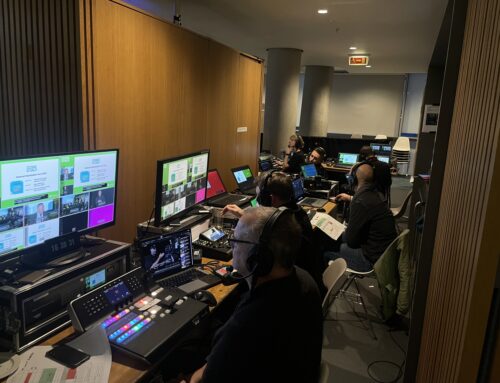An event space can make or break any conference. It is the blank canvas where your event idea will be brought to life and has a vital impact on every element of the events success from layout and atmosphere to management and logistics. It is one of the very first tasks to be completed and can be daunting as you try and balance important deciding factors like capacity, budget, location, facilities and more. It is overwhelming, and you’re not alone in thinking that! Luckily in Ireland there is a wealth of venues that we can choose from to meet the objectives of our event. In this article we will explore some of the considerations we go through at Go West when we are evaluating an event space. As experienced event managers we have a collection of event partners we trust and have worked with for many years, keep reading to understand how to find the perfect venue based on the event you are running that will and your specific event objectives.
In this article we will explore;
• What makes Ireland a great destination for conferences.
• How to find an event space.
• Considerations when evaluating an event space.
What makes Ireland an excellent destination for conferences?
Ireland is renowned for its dynamic and vibrant atmosphere. With its natural beauty, groundbreaking innovation, rich culture, and warm hospitality, it’s no wonder it’s a sought-after destination for conferences and events. Ireland offers a unique and easily accessible experience for conference attendees, thanks to its modern infrastructure, world-class facilities, and central location in Europe. In 2023, Ireland was the stage for over 130 association conferences spanning various industries, making it an even more attractive option for event planners. As members of the AIPCO we are constantly working to promote Ireland as an attractive destination for international clients, having brought international conferences such as DotMD, Food on the Edge and ISEH to Irish venues.
How to find an event space:
The best event space is one that aligns with the style and objectives of your conference. In the pre-planning stage, you and your team must set clear and SMART (Specific, Measurable, Attainable, Relevant, Timed) objectives. Doing this will guide your search and inform the final decision, this should take time and all angles should be considered. Ideally, start the search as soon as possible, depending on the size of the conference. For instance, a large-scale conference (500 attendees plus) you will need to start your search at least two years in advance this will allow time for negotiations and contract signing.
Beginning your search can be the most challenging part; a good place to start is places you are already familiar with in that location. Reach out and enquire, if they cannot accommodate you can ask for recommendations on where they think would suit you. People are much more likely to help than you think.
A great resource you can use to start your search is the Meet in Ireland website. There, you can find results for venues by refining your results based on your own specifications they have a fantastic data base for you to work from. You could also skip all this hassle and let Go West take care of everything we have strong relationships with venue partners all over Ireland and we will, without a doubt be able to find a host for your event.
Things to consider when searching for an event space:
In this section, we will discuss the crucial aspects of an event space which need to be considered during your search. Remember the objectives you set in the pre-planning stage will help you answer the questions at each step. Stick around to the end and download our event checklist to take this to your site visit.
Location, Location, Location:
I know what you’re thinking, obvious one. However, there are some things that you might have yet to consider about the location of your event. All businesses today face improving their products or services to account for the environment and the events industry no different. You want your event to be accessible by public transport routes to encourage guests to take the bus or the train on their commute, this will greatly reduce the carbon footprint of your event. To increase accessibility of the event, the venue should be located near accommodation so guests from out of town can attend.
Capacity and minimums:
From your initial planning phase, you should have projected numbers of attendees, you can estimate this off demand for similar events you have seen. You will need to identify if the venue will have the space to hold your guests, equipment such as stage set up, and have adequate room for additional elements like networking and vendor space. You also should enquire whether there is a minimum on the price for catering provided.
Layout and design:
Although deciding on the event space comes early in the planning process, you will still need a general idea on the layout of the event, a good way to do this is by identifying your event activities. Match your event activities with your objectives. For example, if one of your objectives is to increase exhibitors selling opportunities, your activity would be to ensure there is a large common area with a good traffic flow to each exhibit. It is a good idea when visiting the event space to ask for a floor plan, by mapping out where each event activity and element will go you will be able to ensure the venue meets your event needs.
Budget:
Event managers are always looking at the bottom line, the event space is the biggest cost and as a result, needs the most attention. Unfortunately, cost when choosing an event is not as straightforward as it may seem. Each venue will calculate their prices differently and take a multitude of factors into account, the main pricing models are hiring fees, cost per person and minimum spend.
Here are some factors that might affect the price of the venue:
Date – Try avoiding booking in peak season, especially in big cities like Dublin
Additional Fees – Be aware of hidden fees, such as service charges, cleaning fees, security fees, and taxes. These can add to the overall cost.
Insurance and Liability – Some venues require event organizers to have liability insurance. The cost of insurance can vary, affecting your overall expenses.
Vendor Restrictions – Some venues have restrictions on the vendors you can use. If you’re required to use specific vendors, it can affect your budget, as those vendors may have set prices.
Here are some tips to give you an edge in price negotiations:
Most importantly, ALWAYS ask for your agreement in writing. Ensure you get the event, time and other details in a written contract.
Negotiate – Feel free to negotiate with the venue. Ask for room for price flexibility, especially if you’re booking well in advance. Venues may be willing to offer discounts to secure your business.
Bundle Services – Inquire if the venue offers package deals that include services like catering, audiovisual equipment, or decore. Bundling services can often lead to cost savings.
Multi-Event Discounts – If you have multiple events or need various spaces within a venue (e.g., breakout rooms for a conference), ask if they offer discounts for booking more than one space.
Loyalty or Referral Discounts – If you’ve worked with the venue before or were referred by someone, inquire about loyalty or referral discounts.
Style of event:
How the venue looks and is set up will significantly affect the guests experience and overall perception of the event. You need to ensure that the style of your event will suit the architecture and design of the event space the two need to work seamlessly together. For example, if you’re planning a gala, your requirements will differ from those of an expo. If the event space does not have the style, you are looking for you would need to account for additional spending in decorations to bridge the gap, this can create extra cost in the venue budget.
Safety & Accessibility:
Does the event space have proper safety measures, including fire exits, first aid kits, and emergency procedures? Is there space in front of the fire for the guests to exit safely, and will event equipment obstruct due to lack of space. The event needs to be accessible to all. The venue should have facilities for people with disabilities to attend without any issues.
Sustainability:
To ensure your event meets its carbon requirements the venue you hire should be environmentally conscious. You can ask how they measure their carbon footprint and what measures they have implemented recently to improve their sustainability. For example, they could have been recently re-insulated, meaning less energy will be used to heat the venue. To get a comprehensive understanding, you can ask for their environmental policy.
You are now ready to start your search to find you perfect event space. If you follow these different steps on your search, you will set your event up for success. Good luck and have a great event!




